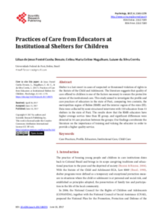Abstract
Shelter is a last resort in cases of suspected or threatened violation of rights in the Statute of the Child and Adolescent. The literature suggests that quality of care offered to children is one of the factors necessary to ensure the protective nature of the institutional care. This study aimed to investigate the profile and care practices of educators in the state of Pará, comparing two contexts, the metropolitan region of Belém (RMB) and the interior region of the state (IE). Data were collected by semi-structured interviews with 110 educators from 11 shelters in the state of Pará. The results show that the RMB educators have higher average service time than IE group, and significant differences were detected in 14 care practices between the groups. Our findings corroborate the literature on the importance of training and valuing the educator in order to provide a higher quality service.

